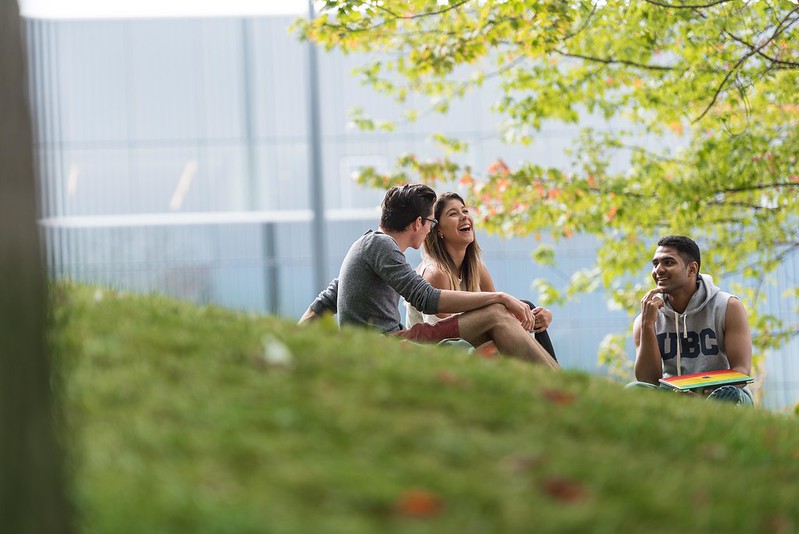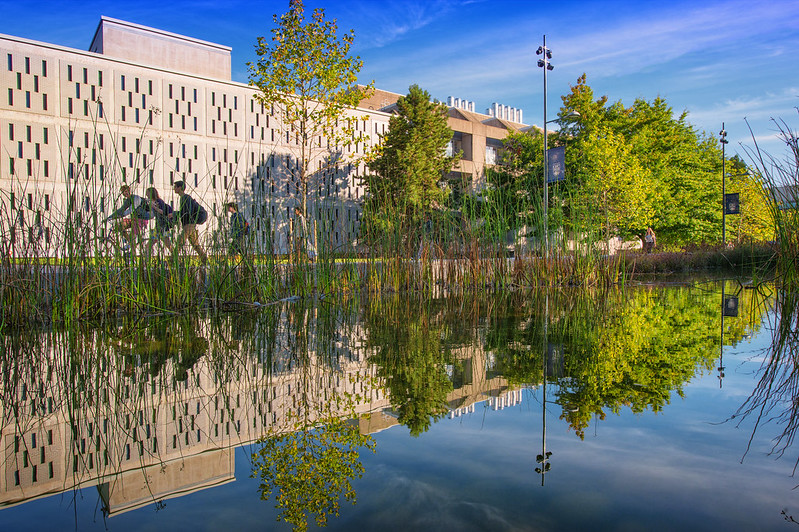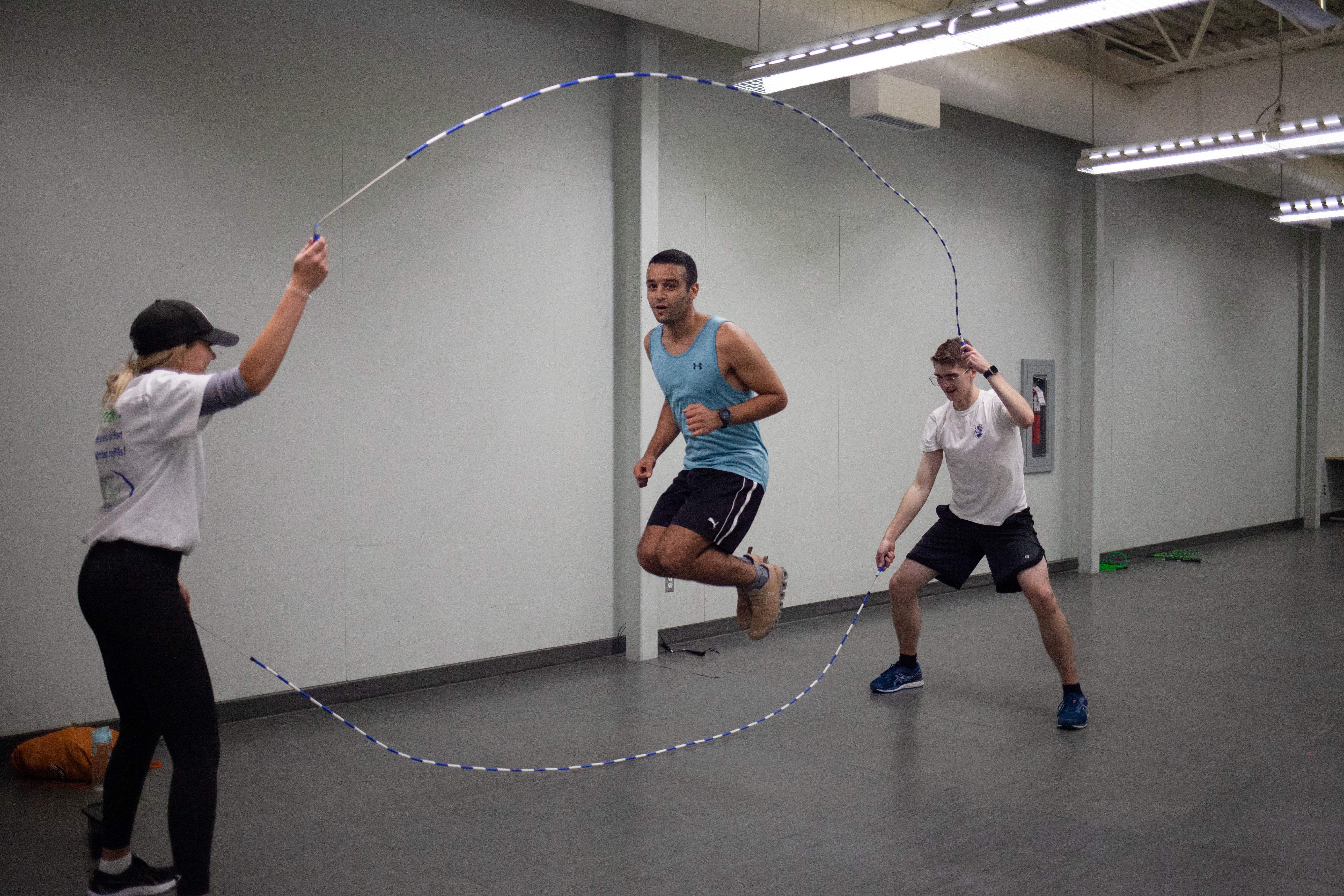UBC Wellbeing Annual Report 2021-22
Over the past year, teams across UBC Vancouver and Okanagan campuses faced new complexities and uncertainties impacting the health and wellbeing of our community. Through an evolving pandemic and ongoing interconnected societal and systemic issues, teams continued to tackle challenges and activate the Okanagan Charter and Wellbeing Strategic Framework targets in support of campus communities where health and wellbeing are championed.
This annual report represents and celebrates the collective efforts and resilience of university-wide teams sparking innovation, leading action, and inspiring positive change for people, places, and the planet. Explore cross-campus highlights in the UBC Wellbeing Annual Report 2021-22 Infographic or scroll down to view data metrics and read stories featuring the wellbeing efforts of diverse teams across each Priority Area.
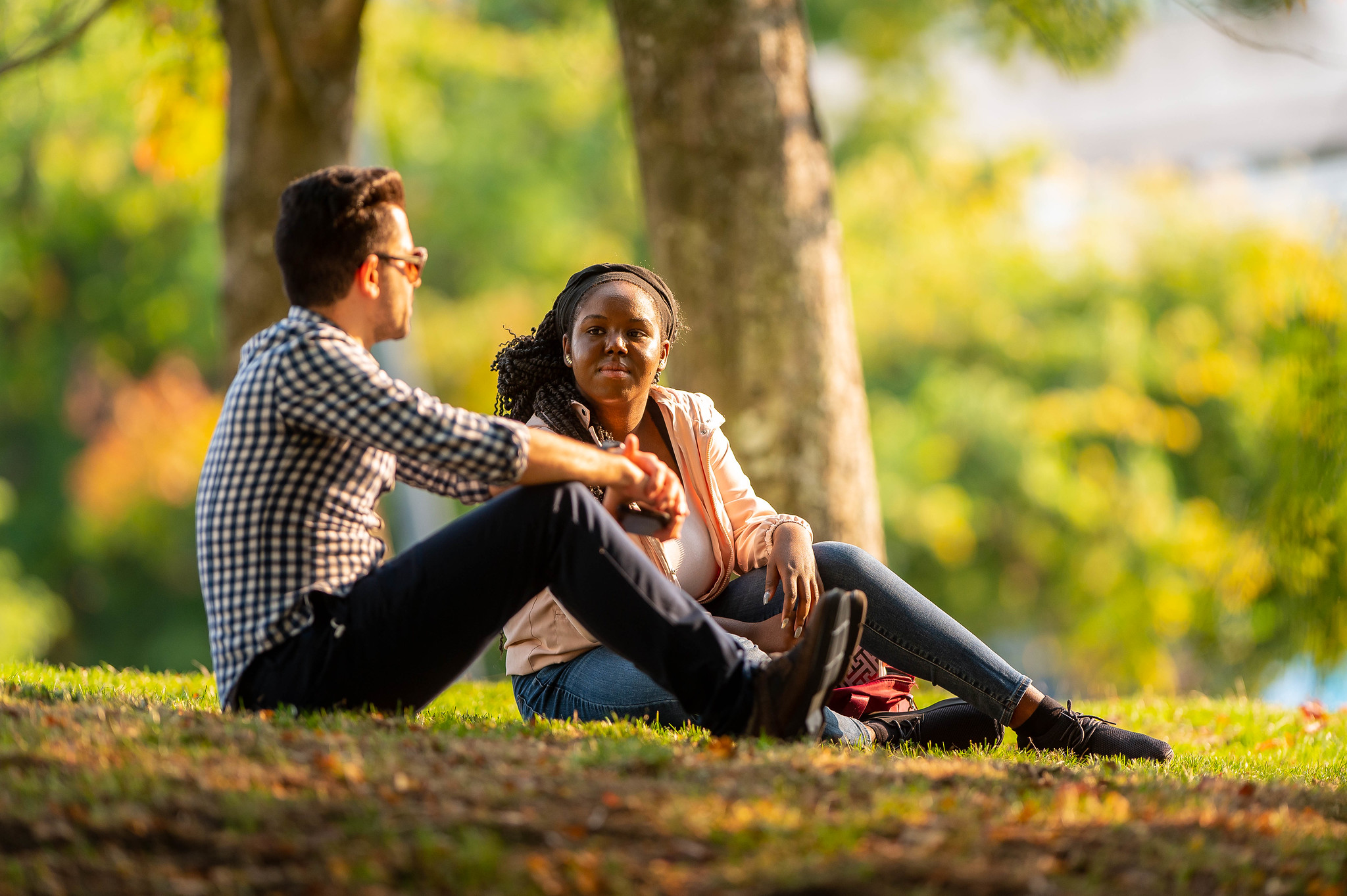
Mental Health & Resilience
![]()
UBC Cares
10% increase in community members who feel mental health is a UBC priority by 2025.
Measure
At UBC, I feel that student, staff and faculty mental and emotional wellbeing is a priority (% who strongly agree or agree)*
UBC Vancouver
| Population | Data | Change from Baseline (B) |
| Undergraduate Students | 20% | -9% (decline) |
| Graduate Students | 30% | -6% (decline) |
| Staff and Faculty combined | 41% | B |
| Staff | 44% | B |
| Faculty | 29% | B |
UBC Okanagan
| Population | Data | Change from Baseline (B) |
| Undergraduate Students | 28% | -17% (decline) |
| Graduate Students | 39% | -14% (decline) |
| Staff and Faculty combined | 48% | B |
| Staff | 53% | B |
| Faculty | 26% | B |
Source:
- Students: Baseline from CCWS 2019 (pre-COVID pandemic); Latest data from CCWS 2021 (during COVID pandemic)
- Faculty / staff: Latest data (/ baseline) from CCWS 2021 (during COVID pandemic)
![]()
Mental Health Literacy
10% increase in community members reporting access to opportunities to develop mental health literacy by 2025.
Measure
If I needed to seek professional help for my mental or emotional health, I would know how to access resources (online or in-person) provided through my employer. (% who strongly agree or agree)*
UBC Vancouver
| Population | Data | Change from Baseline (B) |
| Staff and Faculty combined | 68% | B |
| Staff | 72% | B |
| Faculty | 57% | B |
UBC Okanagan
| Population | Data | Change from Baseline (B) |
| Staff and Faculty combined | 70% | B |
| Staff | 71% | B |
| Faculty | 66% | B |
Source: Latest data (/ baseline) from CCWS 2021 (during COVID pandemic)
Measure
If I needed to seek professional help for my mental or emotional health, I would know where to access campus-based resources (online or in-person). (% who strongly agree or agree)*
UBC Vancouver
| Population | Data | Change from Baseline (B) |
| Undergraduate Students | 34% | -2% (decline) |
| Graduate Students | 43% | +1% (improvement) |
UBC Okanagan
| Population | Data | Change from Baseline (B) |
| Undergraduate Students | 38% | -10% (decline) |
| Graduate Students | 47% | -3% (decline) |
Source: Students: Baseline from CCWS 2019 (pre-COVID pandemic); Latest data from CCWS 2021 (during COVID pandemic)
Measure
If I needed to seek professional help for my mental or emotional health, I would know where to go for services not offered through my employer. (% who strongly agree or agree)*
UBC Vancouver
| Population | Data | Change from Baseline (B) |
| Staff and Faculty combined | 57% | B |
| Staff | 58% | B |
| Faculty | 53% | B |
UBC Okanagan
| Population | Data | Change from Baseline (B) |
| Staff and Faculty combined | 57% | B |
| Staff | 59% | B |
| Faculty | 51% | B |
Source: Latest data (& baseline) are from CCWS 2021 (during COVID pandemic)
Measure
If I needed to seek professional help for my mental or emotional health, I would know where to go off campus. (% who strongly agree or agree)*
UBC Vancouver
| Population | Data | Change from Baseline (B) |
| Undergraduate Students | 31% | +4% (improvement) |
| Graduate Students | 37% | +5% (improvement) |
UBC Okanagan
| Population | Data | Change from Baseline (B) |
| Undergraduate Students | 37% | +8% (improvement) |
| Graduate Students | 42% | +2% (improvement) |
Source: Baseline from CCWS 2019 (pre-COVID pandemic); Latest data from CCWS 2021 (during COVID pandemic)
Measure
In general, how would you rate your ability to handle day-to-day demands in your life? (% who responded excellent or very good)*
UBC Vancouver
| Population | Data | Change from Baseline (B) |
| Undergraduate Students | 29% | B |
| Graduate Students | 35% | B |
| Staff and Faculty combined | 43% | B |
| Staff | 43% | B |
| Faculty | 43% | B |
UBC Okanagan
| Population | Data | Change from Baseline (B) |
| Undergraduate Students | 32% | B |
| Graduate Students | 37% | B |
| Staff and Faculty combined | 43% | B |
| Staff | 40% | B |
| Faculty | 56% | B |
Source: Latest data (/ baseline) from CCWS 2021 (during COVID pandemic)
Measure
The UBC campus climate encourages free and open discussion about mental and emotional health (% who strongly agree or agree)*
UBC Vancouver
| Population | Data | Change from Baseline (B) |
| Undergraduate Students | 37% | -10% (decline) |
| Graduate Students | 41% | -4% (decline) |
| Staff and Faculty combined | 40% | B |
| Staff | 42% | B |
| Faculty | 30% | B |
UBC Okanagan
| Population | Data | Change from Baseline (B) |
| Undergraduate Students | 46% | -13% (decline) |
| Graduate Students | 45% | -10% (decline) |
| Staff and Faculty combined | 47% | B |
| Staff | 51% | B |
| Faculty | 34% | B |
Source:
- Students: Baseline from CCWS 2019 (pre-COVID pandemic); Latest data from CCWS 2021 (during COVID pandemic)
- Faculty / staff: Latest data (/ baseline) from CCWS 2021 (during COVID pandemic)
Mental Health & Resilience Highlights
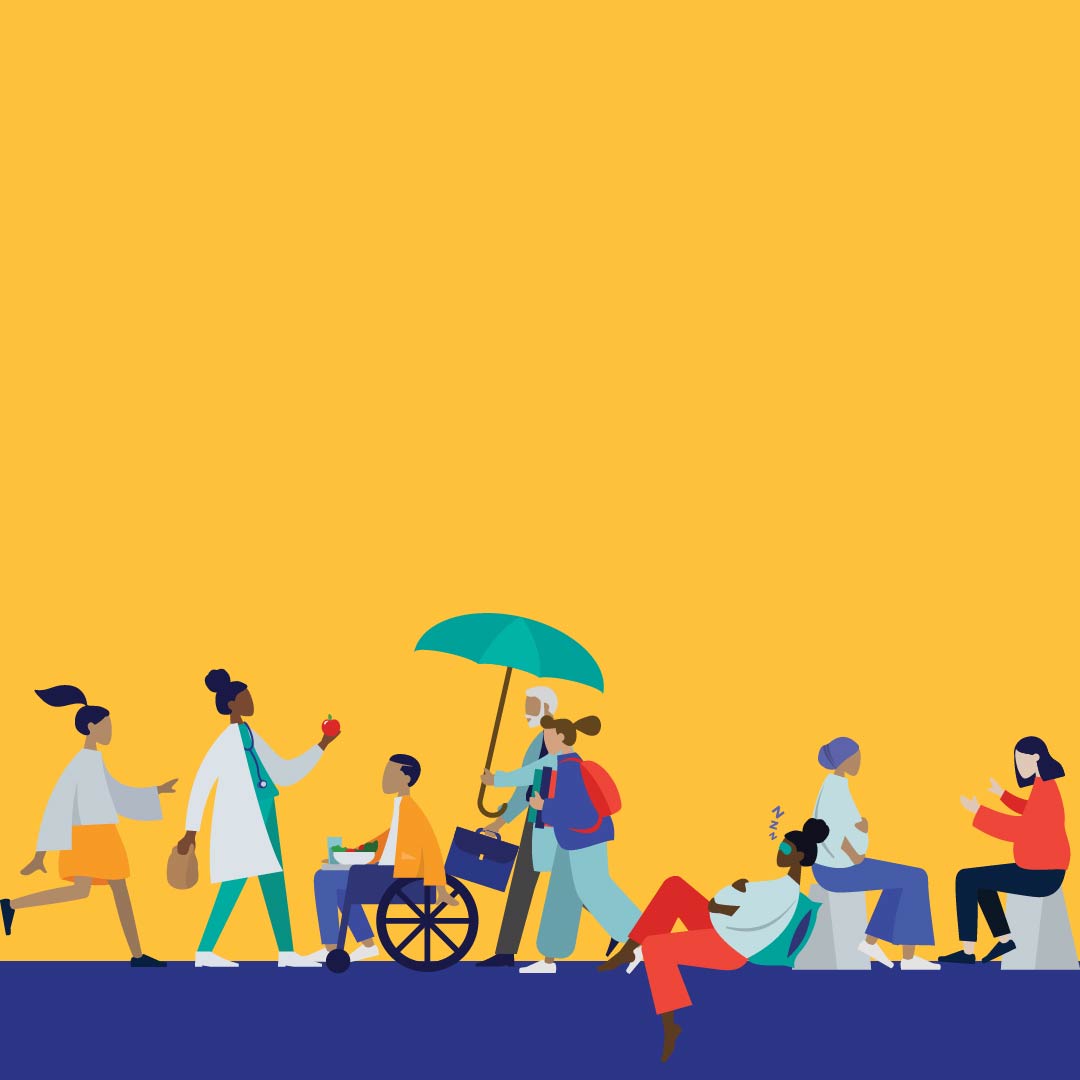
As part of UBC’s Thrive month, the Climate Hub presented the “Acknowledging Climate Grief - Activating Hope & Action” virtual workshop to address and respond to climate-related challenges that have impacted the mental health of our community. This engaging session encouraged participants to share their climate feelings, expand UBC’s climate community, and provide climate mental health and wellbeing resources, coping strategies, research and more.
In 2021, UBC’s Faculty of Medicine (FoM) launched the Faculty Emerging Leadership Program (FELP) for academic and clinical faculty who are emerging leaders. This program supports participants in building leadership knowledge, skills, and providing opportunities for networking.
The Workplace Health, Wellbeing, and Benefits team worked in partnership with FELP and colleagues within the Dean’s office to craft and facilitate a two-hour interactive workshop for program participants as one of five modules. Supporting Wellbeing through Leadership is focused on supporting mental health in the workplace and psychologically healthy and safe leadership practices.
To date, 39 faculty leaders have participated in FELP since its inception.
Learn more about FELP
In response to the toxic illegal drug supply in Canada, as well as the substance use of students returning to campus, the Health Promotion & Education team at UBC Vancouver provided ten training sessions on responding to accidental drug poisoning to all Residence Advisors and six additional groups, with over 350 participants. Harm reduction information was also shared via UBC social media channels to reach student audiences, including UBC Student Life and the Wellness Centre.
At UBC Okanagan, the VOICE Campus Health HaRT (Harm Reduction Team) initiative of Campus Wellness and Education continued to work with students and community partners who research, promote, create, and deliver harm reduction services on campus that are aligned with the best provincial practices.
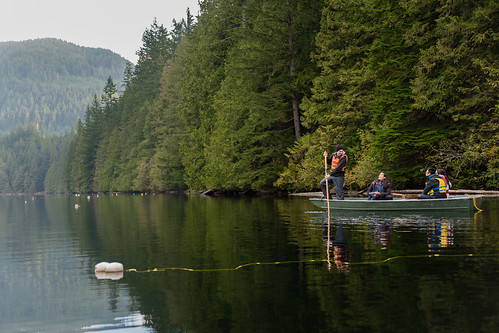
Climate anxiety can take a toll on mental health and worsen existing mental health conditions among people who are anxious about climate change.
UBC graduate student Natania Abebe, a registered nurse and mental health advocate, worked with other UBC students and faculty experts to create the “Exploring Climate Change and Mental Health” resource toolkit to help educators and the general public when navigating climate change issues.
In September 2021, the Wellness Centre launched an in-person information desk and reopened the Sexual Health Shop in support of student-led health and wellbeing programs.
After a one and a half year closure, the Sexual Health Shop resumed its online and in-person sales offering a low barrier, accessible way to purchase condoms, lubricants, and other safer sex and sexual pleasure items. The space provides sexual health education, product education and resource information about local health care options. With the help of the Peer Health Educators, trained student volunteers who aim to educate fellow peers about health and wellbeing, there were 144 visitors at the Sexual Health Shop, and 101 online sales.
In addition, the Wellness Centre offered in-person health and wellbeing support at the newly launched information desk staffed by two co-op students. Students answered fellow peer questions about health and wellness resources, services and support options.
Learn more about the Wellness Centre
A joint project with post-secondary institutions across British Columbia led to the creation of digital stories to encourage students struggling with suicidal ideation to reach out for help and promote evidence-based approaches for support.
Two four-minute stories and three half-minute clips were developed and depict a post-secondary student grappling with suicidal ideation, as their social circle reaches out to offer support. The videos are intended for use in workshops, presentations, social media and public service announcements.
The video series was a collaboration between University of British Columbia, Capilano University, Douglas College, Justice Institute of BC, Langara College, North Island College, Northern Lights College, Okanagan College, Royal Roads University, Vancouver Community College, Simon Fraser University and University of the Fraser Valley. Funding for the project was provided through the B.C. Campus Suicide Prevention Grant, which was awarded to various colleges and universities in 2021 by CMHA BC in partnership with the Ministry of Mental Health and Addiction (MMHA).
A collaboration with UBC Okanagan Campus Wellness & Education, HaRT Harm Reduction Team, and Counseling Services), Residence Life ran a Residence Wellness Hub from October 2021 to April 2022. The Hub included student-facing wellness professionals that were available for drop-in support, including a Nurse Practitioner, Case Manager, Counselors, Harm Reduction Specialists and Health Promotions Coordinator.
The program had numerous successful outcomes. Nurse Nights, which provided the opportunity for students to see the Nurse Practitioner in the evenings, received many visits. The 28 students who were referred through the Early Alert System saw the Case Manager. Students were connected to evening workshops and groups in the building. Several sessions were hosted on healthy sleep habits, naloxone training and confidential drug testing. Students were also connected to group counseling sessions in the building, including topics like masculinity and mindfulness.
The plans for next year include increasing the presence of Case Managers and providing more mental health education outside of the Hub.
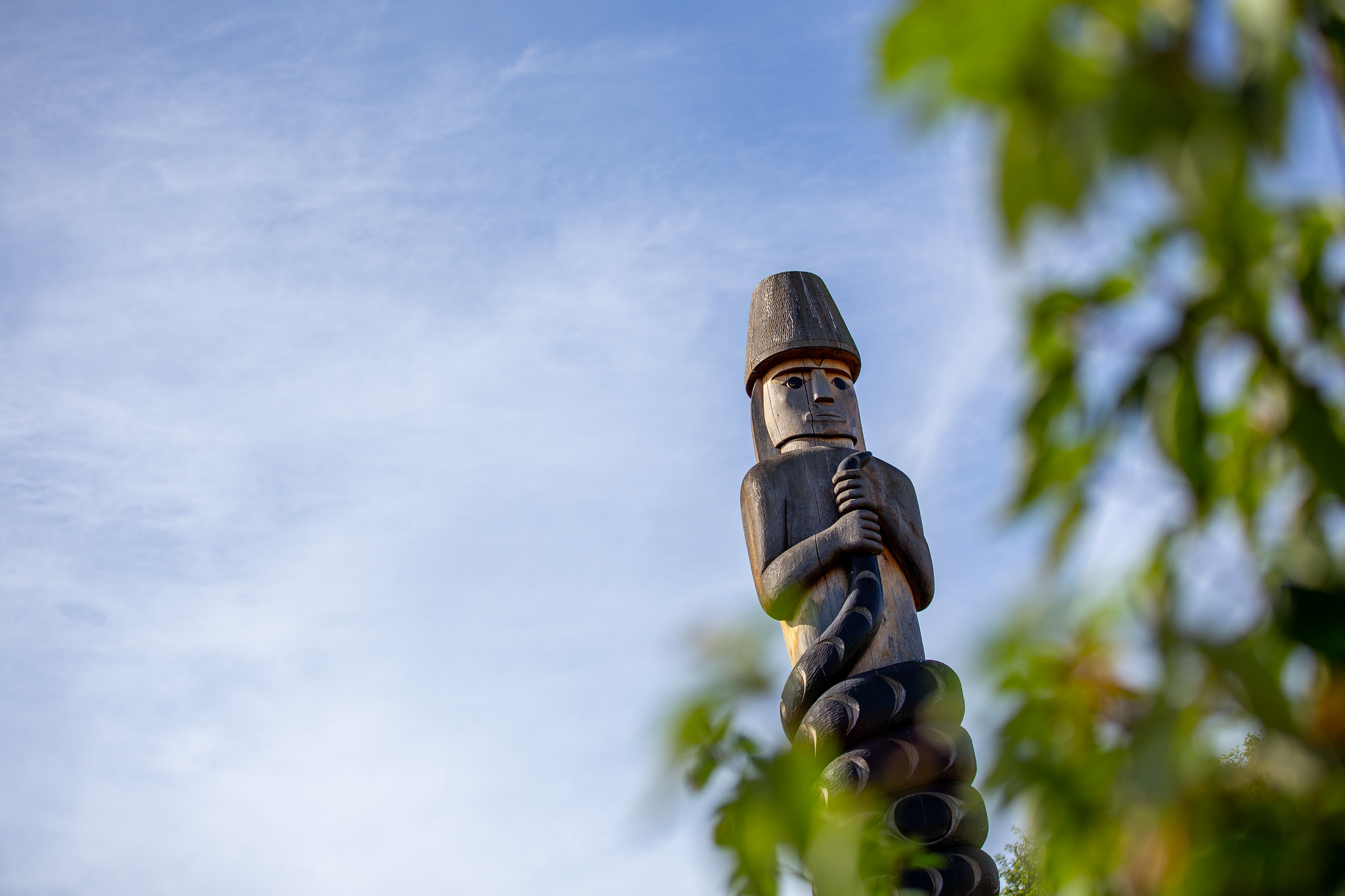
Collaborative Leadership
![]()
UBC is committed to Wellbeing
10% increase in community members who feel UBC is committed to the wellbeing of its people, places, and communities.
Measure
% of students, staff, and faculty who agree or strongly agree that UBC is committed to the wellbeing of its people, places, and communities (% who strongly agree or agree)*
UBC Vancouver
| Population | Data | Change from Baseline (B) |
| Undergraduate Students | 30% | -14% (decline) |
Faculty / Staff / Postdoc | 68% | B |
UBC Okanagan
| Population | Data | Change from Baseline (B) |
| Undergraduate Students | 37% | -22% (decline) |
| Faculty / Staff / Postdoc | 67% | B |
Source:
- Undergrads: Baseline from UES 2019 (pre-COVID pandemic); Latest from UES 2022 (during COVID pandemic)
- Faculty / staff: Baseline and latest data from WES 2021 (during COVID pandemic)
![]()
All Faculties & Units Take Action
All faculties and units are engaged with wellbeing action.
Measure
# of faculties and units
Data collection process in development
Collaborative Leadership Highlights
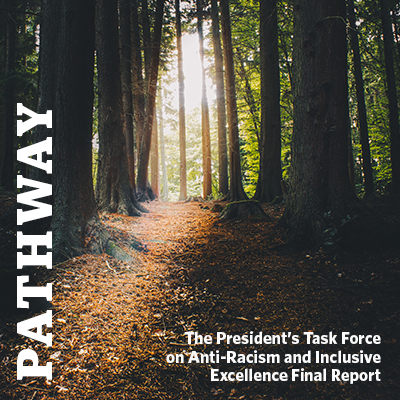
As a response to UBC’s commitment to build a more inclusive university community, the Anti-Racism and Inclusive Excellence Task Force was created and is supported by the Office of the President and the Co-Executive Leads for Anti-Racism.
In April 2021, the Task Force’s six committees representing Work and Study constituencies and Equity Deserving Racialized groups convened to put forward 54 recommendations in its final report, which is now available.
In December 2021, UBC unveiled an ambitious new climate action plan that will accelerate UBC Vancouver’s emissions reductions and achieve net-zero emissions by 2035 - 15 years ahead of the previous target date.
This goal will be achieved by expanding its district heating system, making campus buildings more efficient, improving waste management and promoting sustainable modes of transportation, among other measures.
The university’s Climate Action Plan 2030 (CAP 2030) builds on the success of two previous climate action plans. It also incorporates principles recently outlined in UBC’s 2019 declaration on the climate emergency and its climate emergency task force report.
“We have made significant progress on reducing greenhouse gases generated through campus operations, but there’s still more work to do given the urgency of our climate crisis,” says UBC President and Vice-Chancellor Prof. Santa J. Ono.
In December 2021, UBC was among thousands of international health promotion leaders who met virtually for the World Health Organization’s 10th Global Conference on Health Promotion and to establish the “Geneva Charter for Well-being” — a global commitment to achieving equitable health and wellbeing outcomes for people and the planet based on input from 5,000 people from 149 countries. Building on the 1986 Ottawa Charter for Health Promotion and nine global conferences on health promotion, this foundational document aims to inspire policy-makers and global leaders across diverse sectors towards concrete action.
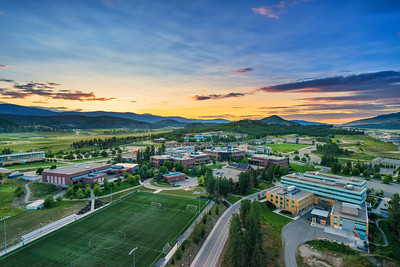
In April 2021, several groups of healthy campus champions were recognized and celebrated at UBC Okanagan with the inaugural Workplace Wellbeing Champions event, the Golden Apple Award, and the I Am Accessible Award,
The Workplace Wellbeing Champions event hosted by UBC Okanagan Workplace Health and Wellbeing HR and Athletics and Recreation celebrated staff, faculty, and leaders championing health and wellbeing promotion in the workplace by engaging in Workplace Health and Wellbeing programs, including the Workplace Wellbeing Ambassador Program, Not Myself Today Initiative, Thriving Workplaces Micro Fund, Healthy Workplace Initiatives Fund, and the Wellbeing Action Network, among others. In support of actioning the Wellbeing Strategic Framework’s Collaborative Leadership milestone to develop an engagement approach to unify action, capacity, recognition, and connection of wellbeing champions (learn more at WSF Roadmap), this event provided an opportunity for staff and faculty to connect socially in a meaningful way.
The Golden Apple and I Am Accessible Awards, hosted by UBC Okanagan Campus Health and the Disability Resource Centre, are student-driven awards celebrating faculty and staff who exemplify the qualities of a wellbeing and inclusive focused educational institution. Nominees and winners are faculty and staff who have gone the extra mile to champion student wellbeing and accessibility at UBC Okanagan.
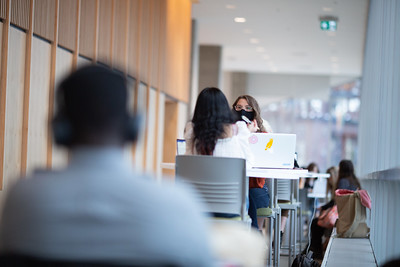
To meet the 2025 Targets outlined in the Wellbeing Strategic Framework (WSF), a four-year roadmap with key milestones is underway with Wellbeing Priority Area Committees and other key stakeholders. The Roadmap will also include lead and contributing units, timelines, and status updates, indicating if milestones are on track, need attention, or are on hold.
Over the next four years, several key units – as well as many supportive partners across UBC – will work to strengthen collaboration and align efforts on identified health and wellbeing priorities.
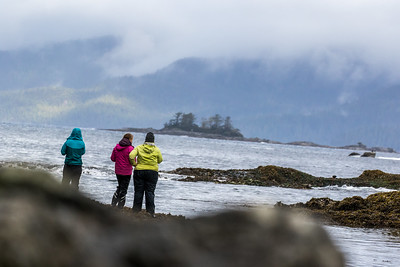
On March 22, 2022 the Sustainability Hub and Centre for Sustainable Food Systems at UBC Farm invited guests from across the UBC community and the Musqueam Nation to collectively reflect on the songs and stories of transformation that will support the creation of new (and renewed) pathways for sustainability and climate justice.
Three Indigenous scholars – Dr. Danielle Ignace, Assistant Professor, Forestry and Conservation Sciences; Dr. Shandin Pete, Assistant Professor, Earth, Oceans and Atmospheric Sciences; and Daqualama (Jocelyn Joe-Strack), Research Chair in Indigenous Knowledge, Yukon University – opened the circle in search of stories to help us restore and re-story our world and our relationships with it.
In March 2022, the Global Lounge, UBC International Relations Student Association, First Generation Students Union at UBC, UBC Students for Partners in Health Canada and SDG Student Hub at UBC organized a panel-style-conversation to explore the intersections of international development and mental health in a way that considers the inequality, injustice, and power systems behind the lack of collective wellbeing.
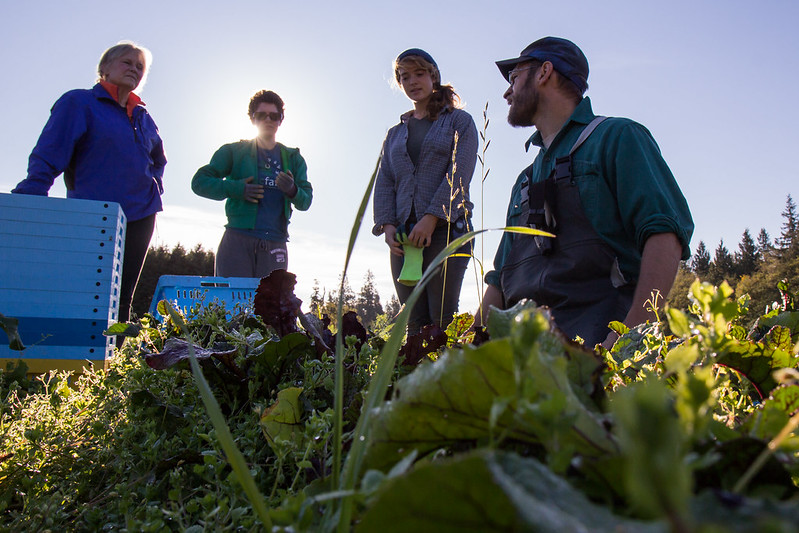
Food & Nutrition
![]()
Increase Food Security
Reduce food insecurity for UBC community members by 2025.
Measure
% of population reporting food insecurity.
UBC Vancouver
| Population | Data | Change from baseline (B) |
| Undergraduate Students | 13% | -24% (improvement) |
| Graduate Students | 20% | -22% (improvement) |
| Staff and Faculty combined | 5% | B |
| Staff | 6.25% | B |
| Faculty | 2% | B |
UBC Okanagan
| Population | Data | Change from baseline (B) |
| Undergraduate Students | 13% | -16% (improvement) |
| Graduate Students | 23% | -19% (improvement) |
| Staff and Faculty combined | 8% | B |
| Staff | 9.52% | B |
| Faculty | 0% | B |
Source:
- Students: Baseline: CCWS 2019 (pre-COVID pandemic); Latest data from CCWS 2021 (during COVID pandemic)
- Staff and faculty: Baseline from CCWS 2021 (during COVID pandemic)
*The dramatic decrease in aggregate CCWS or measured food insecurity rates during the pandemic is hypothesized to have resulted from students moving home to live with their families, government financial supports, and other unknown factors. This decrease was also observed at other Canadian higher education institutions. We suspect that for particular communities (e.g. those who lost employment/ income, international students who couldn’t access Canadian financial supports, and others), food insecurity prevalence may have increased or remains high.
![]()
Healthy Beverage Consumption
50% increase in healthy beverage consumption on our campuses by 2025.
Measure
% healthy beverage sales.
UBC Vancouver
| Location | Data | Change from baseline (B) |
| Food Services & Athletics/Rec | 68% | B |
| AMS | 32% | B |
UBC Okanagan
| Location | Data | Change from baseline (B) |
| SHCS, Athletics, UBC-O Food Services | 100% | +22% |
| SUO | TBD |
Data:
- Baseline from 2019/20 (pre-COVID pandemic)
- Latest data: UBCO 2021/22 (during COVID pandemic); UBCV 2019/20 (pre-COVID pandemic)
Measure
% healthy beverage availability in vending.
UBC Vancouver
| Campus | Data | Change from baseline (B) |
| Vancouver | 75% | +1% (improvement) |
UBC Okanagan
| Campus | Data | Change from baseline (B) |
| Okanagan | 100% | +31% (improvement) |
Data:
- Baseline from 2019/20 (pre-COVID pandemic)
- Latest data: UBCO 2021/22 (during COVID pandemic); UBCV 2020/21 (during COVID pandemic)
Measure
# outlets with no sugar-sweetened beverages (SSB).
UBC Vancouver
| Location | Data | Change from baseline (B) |
| Food Services, SHCS, & Athletics/Rec | 2 | +2 (improvement) |
| AMS | 0 | B |
UBC Okanagan
| Location | Data | Change from baseline (B) |
Food Services, SHCS, | 1 of 3 | +1 (improvement) |
| SUO | TBD |
Data:
- Baseline from 2019 (pre-COVID pandemic)
- Latest data from 2019/20 (pre-COVID pandemic)
Measure
% buildings that have at least one tap water fixture with bottle filling capacity.
UBC Vancouver
| Campus | Data | Change from baseline (B) |
| Vancouver | 91% | B |
UBC Okanagan
| Campus | Data | Change from baseline (B) |
| Okanagan | 100% | B |
Data: Baseline for UBCO: 2019/20 (pre-COVID pandemic); UBCV 2018/19 (pre-COVID pandemic)
Food & Nutrition Highlights
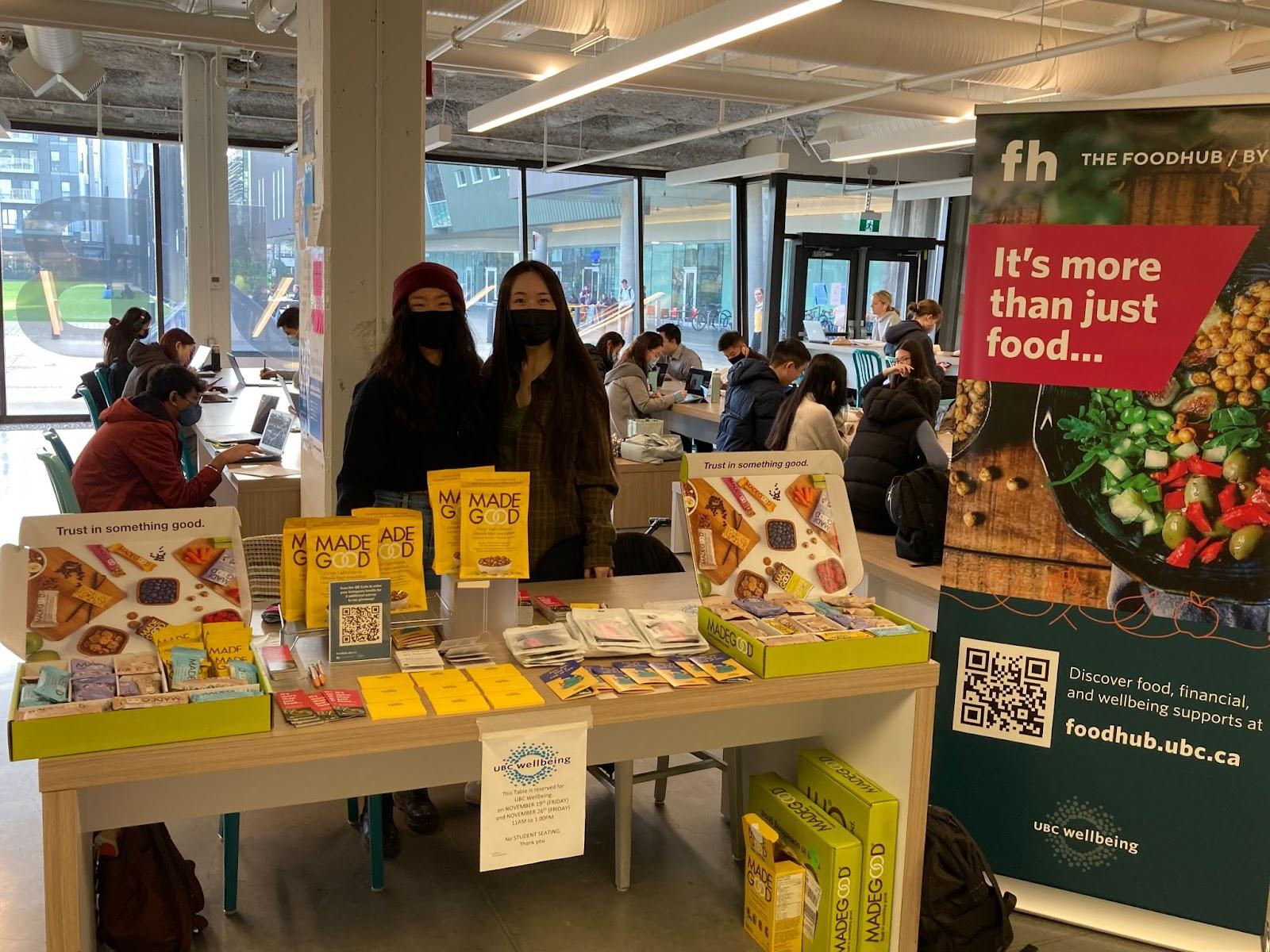
As an extension of the Food Hub website, the Food Hub Market was a 12-week pilot that provided lower cost grocery staples for the UBC Vancouver community, particularly students. This pilot was located in the CIRS building in collaboration with UBC Food Services, Sustainability Hub, and UBC Wellbeing.
This pilot generated over 2,000 transitions/purchases from mid-February 2022 to April 2022 with many students expressing benefits to their health and wellbeing, “I think that having this for the next two school years would help reduce my stress and feel a part of a community and more welcomed and not alone at this campus! Please continue at least until 2024!” As well as the importance of initiatives to address growing food insecurity on campus, “This is an essential resource on campus. We need more initiatives to address food insecurity on campus and the Food Hub's ability to provide accessible and lower-cost food is essential.”
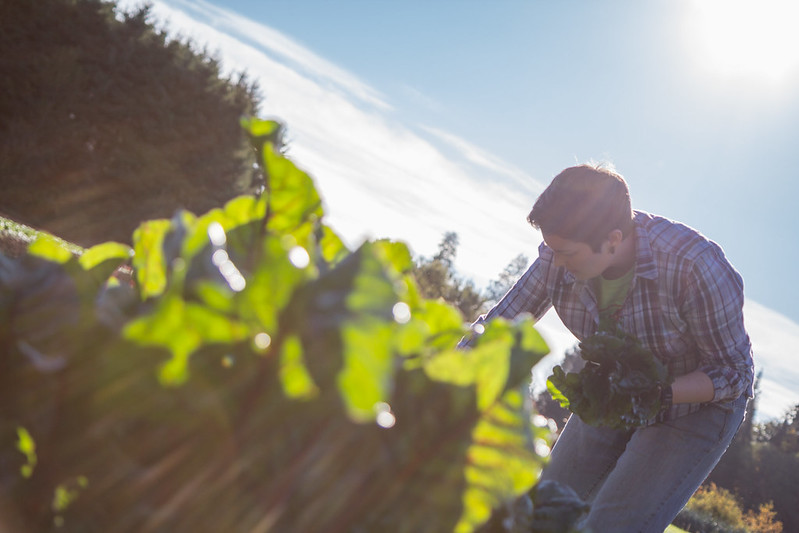
VOICE 5, Food Security at UBCO: What’s your recipe?, aimed to promote healthy living on the UBCO campus by engaging with the campus community to understand the lived-experience of student food insecurity and system level barriers and facilitators to food security on campus. Running from 2019-2021, VOICE helped to address the systemic barriers to food insecurity, identifying priorities and opportunities for actions to reduce student food insecurity, inclusive of individuals of all backgrounds and identities.
Through its multiple reports conducted within the UBCO community, VOICE helped to propose new campus initiatives including bringing more local food onto campus, launching a farmer’s market pilot project, and offering food skills workshops that supported sustainability goals. The team also garnered support for establishing a food hub on campus to expand these initiatives and provided space for continued collaborative visioning and actions to support sustainable food practices.

Did you enjoy one of the tasty, wholesome and affordable meals on UBC Vancouver campus offered at Fooood and Fooood 2.0 this past year? Between September 2021 and April 2022, UBC Food Services served 31,658 meals to the UBC community for the low cost of $3 per meal! Fooood and Fooood 2.0 are operated by UBC Food Services each Sept-April as a non-profit student service, with food and labour costs subsidized by UBC as part of its Food Security Initiative.
About 30-45% of all students experience some form of food insecurity, with BIPOC students at an even higher risk for food insecurity. To help provide a safe space for discussion on this serious issue, UBC’s Health Promotion & Education and the Office of Wellbeing Strategy collaborated with the University of Guelph and University of Waterloo and engaged eleven students in “Visions of a Just, Food Future on Campus: BIPOC Students’ Stories of Food” — a participatory digital storytelling workshop exploring diverse food security experiences. This workshop delved into the role of race, systemic racism, and colonialism in both the food system and the food movement, as well as BIPOC activism and leadership, and movements for Black and Indigenous food sovereignty. Stay tuned to foodhub.ubc.ca for a recording of these stories.
Launched in October 2021, foodhub.ubc.ca is UBC’s digital version of an emerging physical Food Hub space on campus. As a shared community-based platform for UBC Vancouver and Okanagan, the food hub website serves as a one-stop-shop for all UBC community members to increase awareness and centralize resources for food, financial and wellbeing resources. This website also provides the opportunity to promote food-secure campuses that promote equity, inclusion, reconciliation, decolonization, sustainability, positive student experience and health and wellbeing.
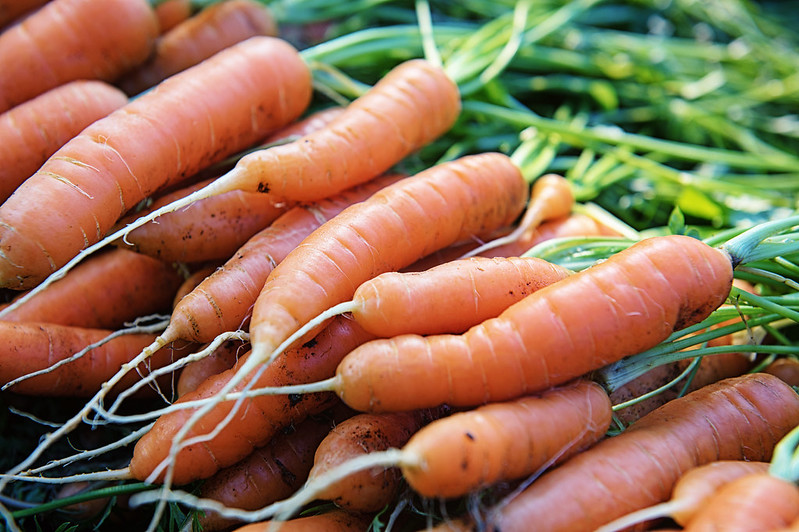
Through an iterative phased approach supported by Campus as a Living Lab, a team of Student Community Developers (SCD) at UBC Vancouver campus engaged campus food security stakeholders and community members to inform the design, operations and services, evaluation measures, and governance of a physical Food Hub. The SCD team collected data through online surveys, dialogue sessions and community events reaching 537 people between October 2021 and April 2022.
This research identified current gaps in food security support for students at UBC, and produced reflections and recommendations, all of which will inform the future development of a physical Food Hub location on campus. A report of the findings will be shared in fall 2022.
FNH 473 (Applied Public Health Nutrition) students collaborated with the UBC Wellness Centre to survey 173 students to understand the experiences and opportunities for students accessing culturally appropriate foods on campus in relation to food security.
When asked to define “culturally accessible food,” 91% of students selected “authenticity/taste” as part of their definition. 30% of students felt that “having my traditional foods represented and offered on campus provides me with a sense of belonging.” The top 3 challenges shared by participants were lack of variety, affordability, authenticity.
Some of the implications include impaired health and wellbeing and/or loss of connection with one’s culture. To address the above, some students suggested including more diversity in foods available (African, Middle Eastern, etc.), hosting subsidized food-related pop-up events, and hiring chefs with the same cultural backgrounds as the foods being served on campus.
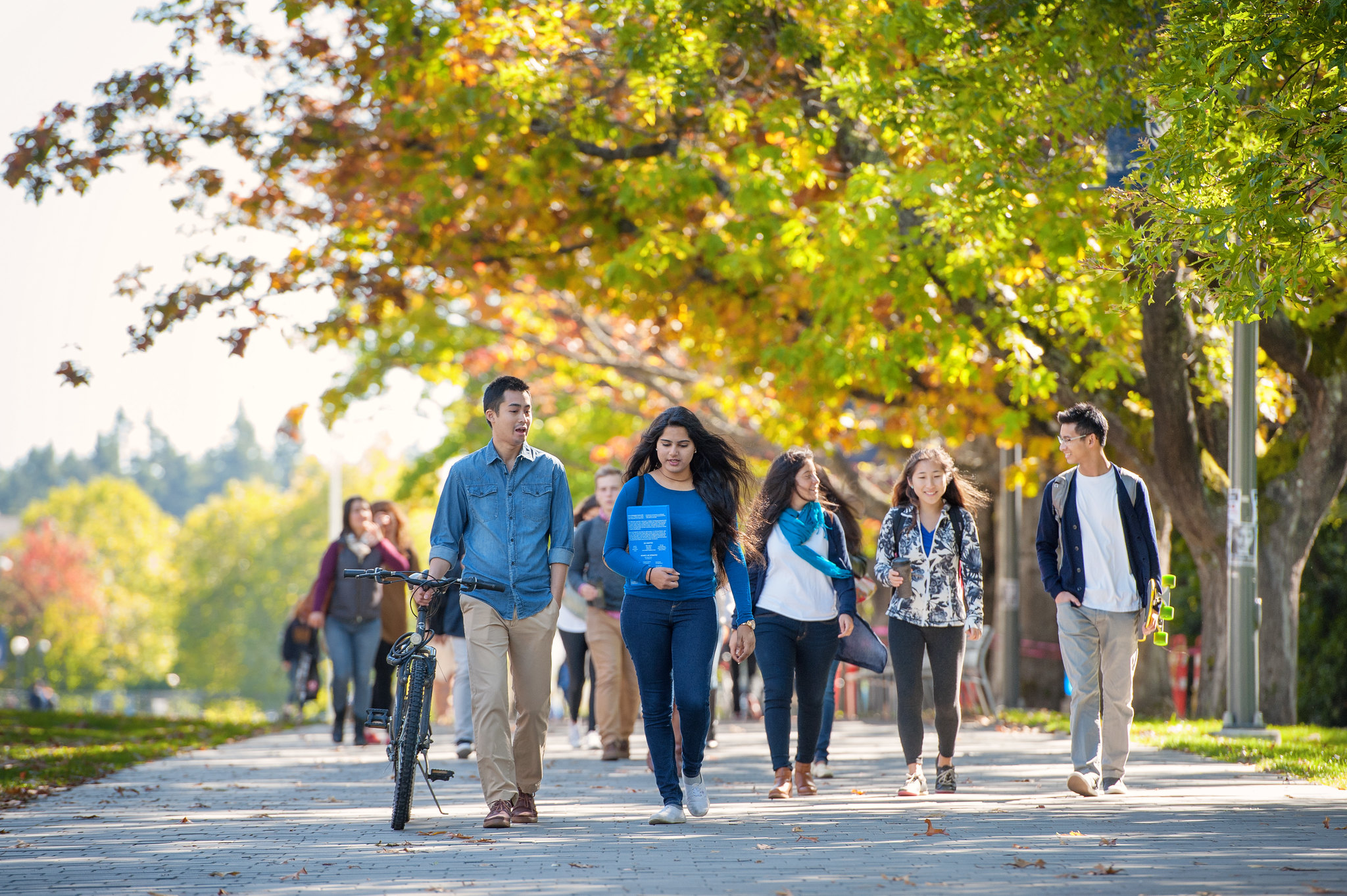
Social Connection

Feel Part of a Community
10% increase in UBC community members feeling part of a community by 2025.
Measure
I have a group, community, or social circle at school (my workplace) where I feel I belong (feel at home, known connected to, support in my identity) (% who strongly agree or agree)*
UBC Vancouver
| Population | Data | Change from baseline (B) |
| Undergraduate Students | 42% | -15% (decline) |
| Graduate Students | 44% | -15% (decline) |
| Staff and Faculty combined | 54% | B |
| Staff | 55% | B |
| Faculty | 51% | B |
UBC Okanagan
| Population | Data | Change from baseline (B) |
| Undergraduate Students | 46% | -8% (decline) |
| Graduate Students | 47% | -15% (decline) |
| Staff and Faculty combined | 53% | B |
| Staff | 57% | B |
| Faculty | 39% | B |
Source: CCWS 2021 (during COVID pandemic) and baseline for students from CCWS 2019 (pre-COVID pandemic)
Measure
% First-year students that visit Collegia (Vancouver only) at least once a week
| Campus | Data | Change from baseline (B) |
| Vancouver | 22% | -11% (decline) |
Data: Baseline from 2019/20 (pre-COVID pandemic); Latest data from 2021/22 (during COVID pandemic)
Measure
I feel that I am part of a community at UBC (% who strongly agree or agree)*
UBC Vancouver
| Population | Data | Change from baseline (B) |
| Staff and Faculty combined | 63% | -7% (decline) |
| Staff | 65% | -7% |
| Faculty | 57% | -6% |
UBC Okanagan
| Population | Data | Change from baseline (B) |
| Staff and Faculty combined | 63% | -4% (decline) |
| Staff | 69% | -6% |
| Faculty | 47% | -5% |
Data: Latest data is from WES 2021 (during COVID pandemic) and baseline data is from WES 2017 (pre-COVID pandemic)
![]()
Inclusive Environment
10% increase in UBC community members reporting that their beliefs, identity and experiences are valued by 2025.
Measure
At my institution, I am respected regardless of my personal characteristics, identity or background (e.g., gender, ethnicity, international status, disability, etc.). (% who strongly agree or agree)*
UBC Vancouver
| Population | Data | Change from baseline (B) |
| Undergraduate Students | 71% | B |
| Graduate Students | 68% | B |
| Staff and Faculty combined | 67% | B |
| Staff | 69% | B |
| Faculty | 57% | B |
UBC Okanagan
| Population | Data | Change from baseline (B) |
| Undergraduate Students | 79% | B |
| Graduate Students | 68% | B |
| Staff and Faculty combined | 67% | B |
| Staff | 69% | B |
| Faculty | 56% | B |
Source: CCWS 2021 (during COVID pandemic)
Measure
My diversity is valued in the workplace*
UBC Vancouver
| Population | Data | Change from baseline (B) |
| Staff and Faculty combined | 69% | -5% (decline) |
| Staff | 71% | -5% |
| Faculty | 62% | -5% |
UBC Okanagan
| Population | Data | Change from baseline (B) |
| Staff and Faculty combined | 67% | -1% (decline) |
| Staff | 75% | 0 |
| Faculty | 47% | 6% |
Data: Latest data is from WES 2021 (during COVID pandemic) and baseline data is from WES 2017 (pre-COVID pandemic)
Measure
People treat each other with respect and consideration in my workplace*
UBC Vancouver
| Population | Data | Change from baseline (B) |
| Staff and Faculty combined | 78% | +1% |
| Staff | 80% | +2% |
| Faculty | 74% | +1% |
UBC Okanagan
| Population | Data | Change from baseline (B) |
| Staff and Faculty combined | 75% | +6% |
| Staff | 79% | +4% |
| Faculty | 65% | +7% |
Data: Latest data is from WES 2021 (during COVID pandemic) and baseline data is from WES 2017 (pre-COVID pandemic)
Social Connection Highlights

In fall 2021, the Wellness Centre launched the Indigenous, Black, Persons Of Colour (IBPOC) Wellness Mentors program to support the specific wellbeing needs of IBPOC students at UBC’s Vancouver campus. It offered a targeted approach to health equity by providing peer affinity-based support and mentorship as well as wellbeing programming to the IBPOC student community.
During its first pilot year, the IBPOC Wellness Mentors collaborated with over 10 campus partners to engage with over 200 students in events and programming that centred IBPOC experiences in student health and wellbeing. Additionally, the IBPOC Wellness Mentors conducted 30 one-to-one mentoring conversations with students and participated in over 10 outreach activities, reaching over 200 students.
"Thanks for providing so many materials and accessible tools for all those in attendance, it means so much, and further emphasized commitments and importance for the discussion and creative interactive element." – Student participant at a IBPOC Wellness Mentors weekly event
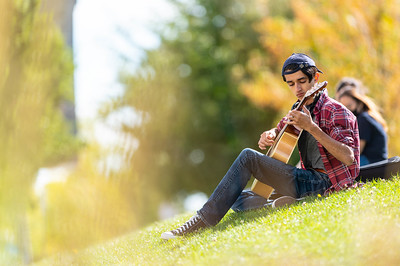
From September to October 2021, the 4th annual UBC ARTIVISM engaged artists and audiences, and provided space for underrepresented voices from our community to explore the intersections of their identity through the digital.
Presented by UBC Arts and Culture District, in partnership with the Exposure UBC student club team, this past year’s festival highlighted stories of resilience and student activist art around the theme of “Queering the Self” that challenges dominant narratives through in-person and virtual live performances, poetry, music and more.
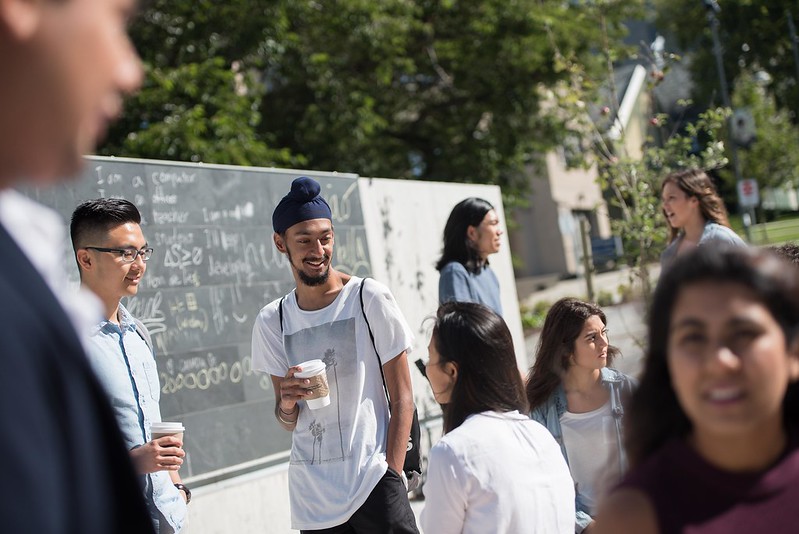
From a community lantern festival to a bike rave, monthly cultural awareness nights and more, the Inspiring Community Grant aims to inspire a sense of community and support social connection. The grants are provided by UTown@UBC, part of UBC Campus + Community Planning, in collaboration with the Vancouver Foundation’s Neighbourhood Small Grants (NSG) and is one of the many granting programs in a regional network of community organizations that serve neighbourhoods across British Columbia.
Open to all UBC students, faculty, staff and residents of Acadia Park, UNA and Musqueam, the fund provides its recipients with up to $500 towards bringing their projects to life. Some of 2021’s funded projects include Seeds for Growth at the UBC Farm, Vaccine Literary Workshop for Youth, and Indigenous Storytelling and Arts night. Since launching in 2016, the grant has supported 200 grant projects led by community members.
The Centre for Teaching, Learning and Technology (CTLT) is committed to supporting wellbeing and creating inclusive work environments for its staff. During the 2021-22 academic year, the CTLT’s Health, Safety & Wellbeing committee led activities focused on 3 key goals: supporting staff’s wellbeing during the transition back to working on campus; helping new hires form connections in the department; and raising anti-racism awareness to encourage an inclusive work environment.
These goals were achieved through several initiatives, including department-wide promotions for UBC initiatives such as ‘Not Myself Today’ and ‘UBC Thrive’’ by creating a blogsite with monthly posts and resources. The committee also hosted two in-person social events to help inspire social connection and offered a workshop called ‘Introduction to Anti-Oppression’, funded by the Healthy Workplace Initiatives Program. In total, approximately 100 CTLT staff members attended these events, and attendees reported that these events helped them to get to know their colleagues and build a sense of togetherness.
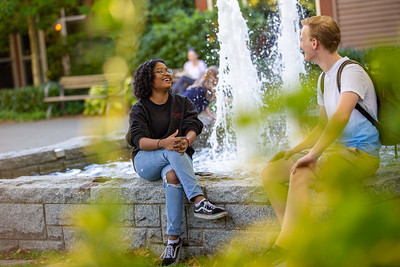
In March 2022, Residence Life staff at UBC Okanagan organized the first Black Excellence Evening in residence where students gathered to celebrate culture and excellence in the black community. With support from UBC Food Services, students cooked and served dishes from Nigeria, South Africa, and the Caribbean. The evening featured performances from BIPOC members of the UBC community as well, receiving community support and donations from six black-owned businesses from Okanagan.
In June 2021, UBC convened a two-day virtual National Forum on Anti-Asian Racism, bringing people together to share stories and find common themes to collectively support efforts against anti-Asian racism in Canada.
Over 2,100 participants from across Canada and 126 panelists gathered to formulate direction for future action. A few of the 8 sector topic areas for deeper discussions included health, justice system, grassroots organizing and coalition building, and more. A discussion shortly after the forum was held for students to share their unique experiences and perspectives when confronting anti-Asian racism. Five key takeaways emerged during the session: student labor, tokenization of student work, lack of resources, recognition of informal organizing and diverse coalition building.
Hosted by Sustainability Hub, Climate Hub and AMS Sustainability, UBC Climate Cafés are conversations with an informal and empathetic atmosphere where students can build hope and a community, form ally-ships and safely share uncertainties about the climate crisis.
This past year, three sessions were held. All attendee survey respondents indicated that they made connections that they hope to continue beyond the events and also were interested in attending future UBC Climate Café events.
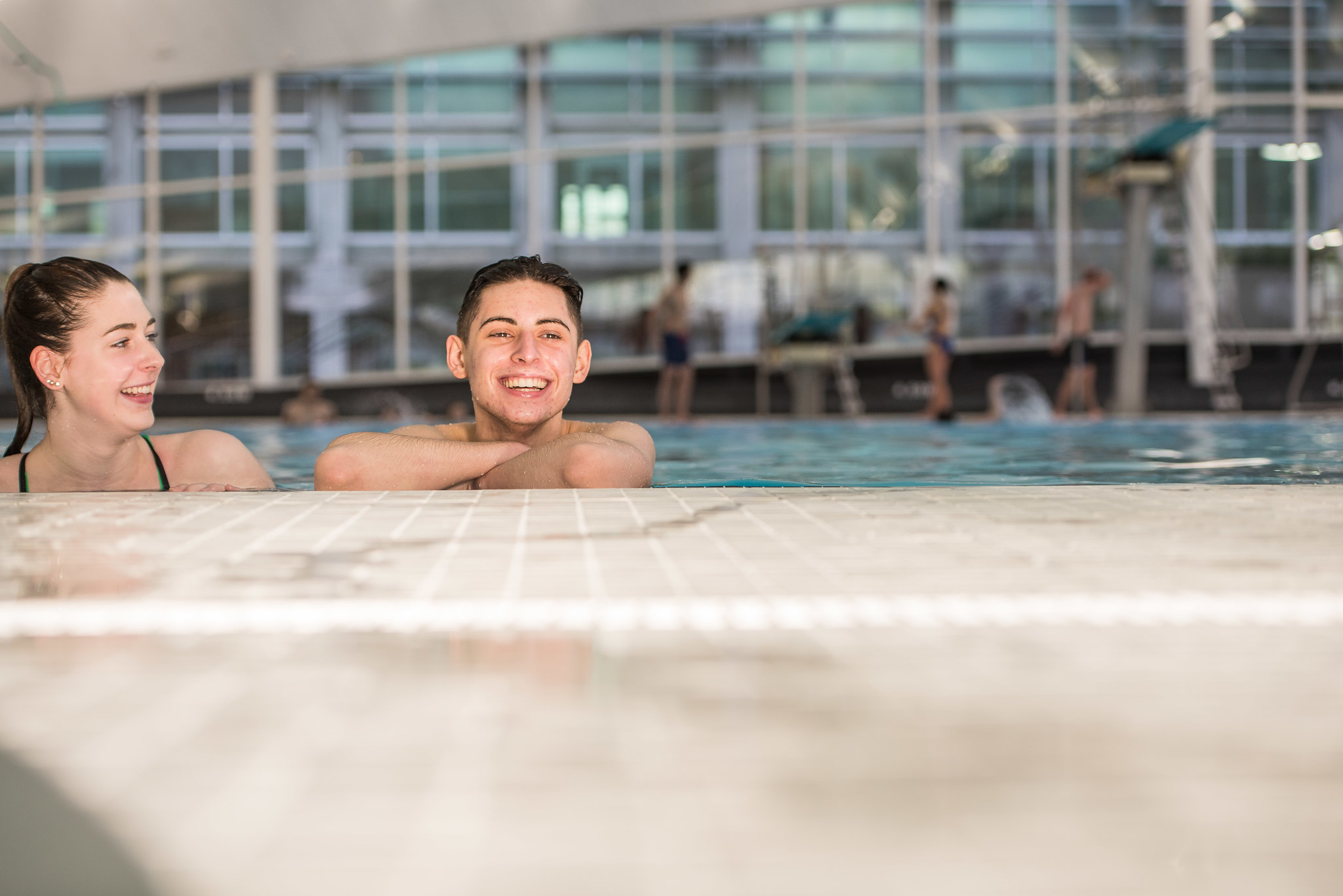
Physical Activity
![]()
Move More
10% increase in the prevalence of physical activity for UBC community members by 2025.
Measure
% of students, staff, and faculty who report meeting the Canadian physical activity guidelines.
UBC Vancouver
| Population | Data | Change from baseline (B) |
| Undergraduate Students | 61% | +6% (improvement) |
| Graduate Students | 65% | +2% (improvement) |
| Staff and Faculty combined | 74% | B |
| Staff | 72% | B |
| Faculty | 80% | B |
UBC Okanagan
| Population | Data | Change from baseline (B) |
| Undergraduate Students | 69% | +7% (improvement) |
| Graduate Students | 70% | +10% (improvement) |
| Staff and Faculty combined | 77% | B |
| Staff | 79% | B |
| Faculty | 81% | B |
Source:
- Students: Baseline from CCWS 2019 (pre-COVID pandemic); Latest data from CCWS 2021 (during COVID pandemic)
- Faculty / staff: Latest data (/ baseline) from CCWS 2021 (during COVID pandemic)
![]()
Diverse Community, Diverse Programming
10% increase in satisfaction with recreation facilities and programs for UBC community members by 2025
Measure
How satisfied are you with the availability of recreation programs on campus? (% who report very satisfied or satisfied)*
UBC Vancouver
| Population | Data | Change from baseline (B) |
| Undergraduate Students | 48% | B |
UBC Okanagan
| Population | Data | Change from baseline (B) |
| Undergraduate Students | 33% | B |
Source: Latest (/ baseline) from UES 2019 (pre-COVID pandemic)
Measure
How satisfied are you with the quality of recreation programs on campus? (% who report very satisfied or satisfied)*
UBC Vancouver
| Population | Data | Change from baseline (B) |
| Undergraduate Students | 48% | B |
UBC Okanagan
| Population | Data | Change from baseline (B) |
| Undergraduate Students | 34% | B |
Source: Latest data (/ baseline) from UES 2019 (pre-COVID pandemic)
Measure
How satisfied are you with the quality of recreation facilities on campus? (% who report very satisfied or satisfied)*
UBC Vancouver
| Population | Data | Change from baseline (B) |
| Undergraduate Students | 46% | B |
UBC Okanagan
| Population | Data | Change from baseline (B) |
| Undergraduate Students | 30% | B |
Source: Latest data (/ baseline) from UES 2019 (pre-COVID pandemic)
Physical Activity Highlights
UBCO Recreation, Global Engagement Office, Indigenous Programs and Services along with 10 SUO clubs and multiple community partners teamed up to offer a series of cultural sporting events that welcome domestic and international students to participate in and learn about intercultural sports. Expert-led games, activities, and workshops included: Latin, Bhangra and Indian classical dance (Kathak and Bharatnatyam), Indonesian Bakiak, mixed martial art Muay Thai, Cricket, Sylix-rooted traditional Indigenous games, rope skipping, badminton, soccer and basketball.
The Move U Crew brought some new beginner sports programs to campus that are not currently offered at the university through a series called “New Moves with the Move U Crew”. Some sports included skateboarding, pickleball, wheelchair basketball, and goalball. These events were a hit, uncovering that there is a need to provide more introductory programs on campus, particularly for niche sports that are not often offered in regular recreation spaces. Through this new program, relationships were built with some external organizations including Undertoe Skateboarding Academy, Morica Sports, BC Wheelchair Sports Association, and BC Blind Sports & Recreation Association.
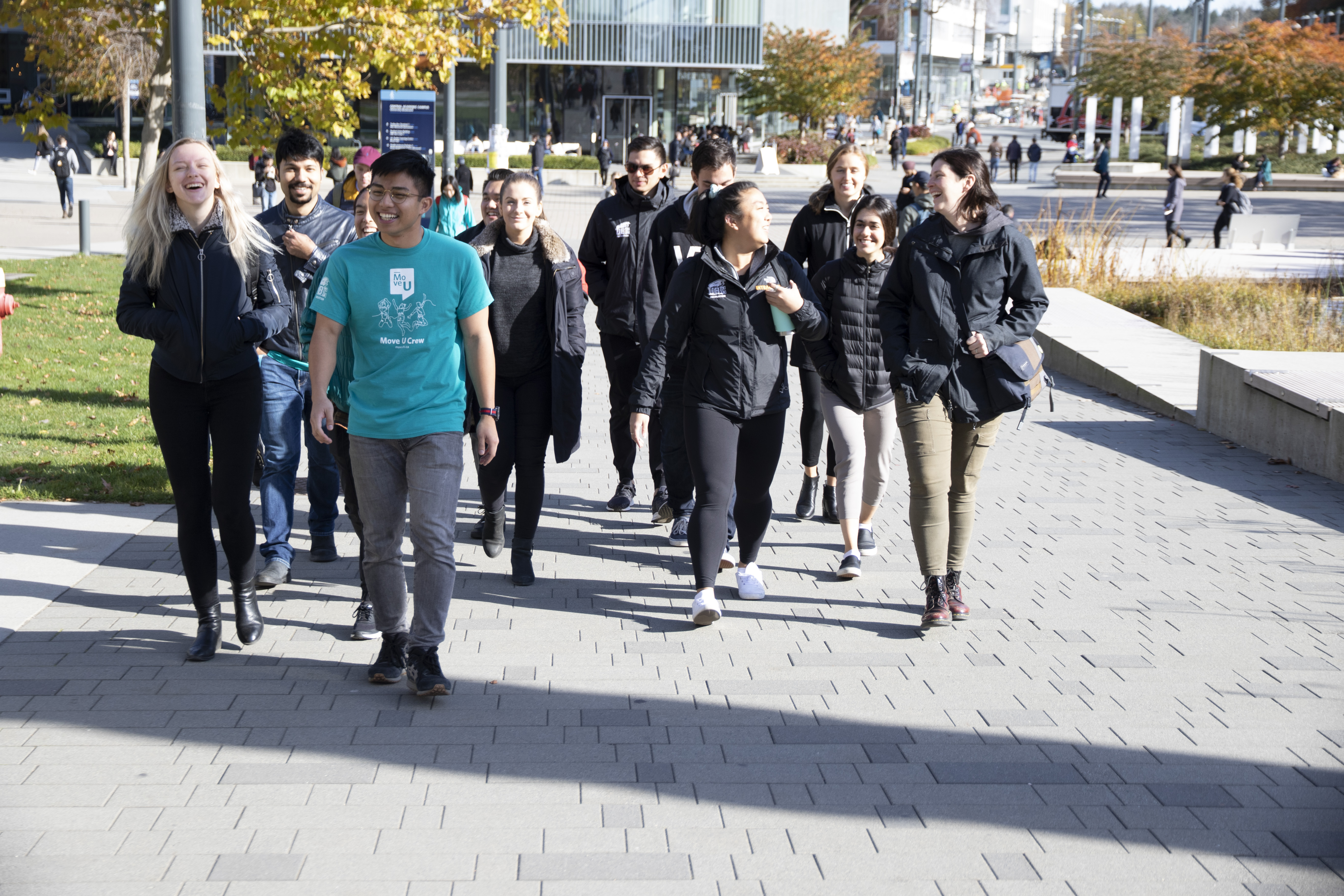
Move UBC is an annual, university-wide campaign to increase physical activity and reduce sedentary behaviour for UBC students, faculty, staff and community. Each February, this initiative supports the Wellbeing Strategic Framework Physical Activity targets by inviting the UBC community to explore ways to move that feel comfortable, empowering, and motivating for them. Recognizing the intersectional nature of movement and its connection to sustainability, this year’s campaign incorporated new messaging around “moving for the planet” to align with campus-wide sustainability and climate action strategic plans by promoting movement as a means to reducing emissions and supporting our environment.
In addition, a new partnership between Move UBC and Climate Emergency Week, organized by UBC Sustainability Hub and Climate Hub, inspired events such as the annual Research Roundtable: Physical Activity & Climate Action on February 18th. This event highlighted the intersections of physical activity, climate action and social justice, encouraging the UBC community to explore ways of moving that positively impact our minds, bodies and the planet.
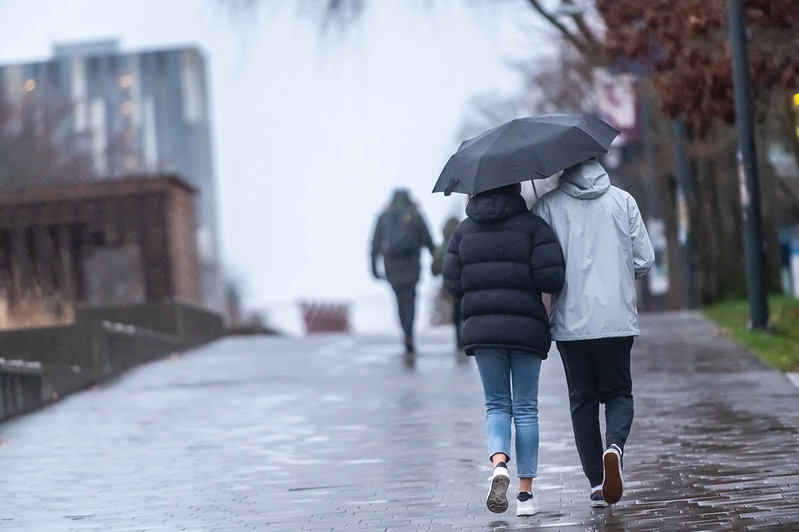
Cirque Du Sore Legs (CSI&C) was one of 42 initiatives funded through the UBC Wellbeing Strategic Initiative Fund via Move UBC grant applications. For the month of February, this initiative encouraged each Workplace Learning team member to reach 10,000 steps each day, from Monday – Friday, by any means necessary (Run, Walk, Pokemon Go, Dance, Etc) and especially by promoting the use of walking meetings. Each day, the team organized a Step-UP mini-event (dance, walk, moveU crew activity, etc) to help team members meet 10,000 steps and get moving.
With a record number of Move UBC grant applications, numerous creative and environmentally conscious initiatives were funded. Scooter Share Program (Animal Care Services), for example, was a scooter share program that offered staff the ability to easily travel on and off campus. Staff could attend required in-person activities across campus with less travel time constraints, they expanded their healthy lunch options off-campus, allowed them to run quick errands more efficiently with zero carbon emissions, and provided exercise around campus.
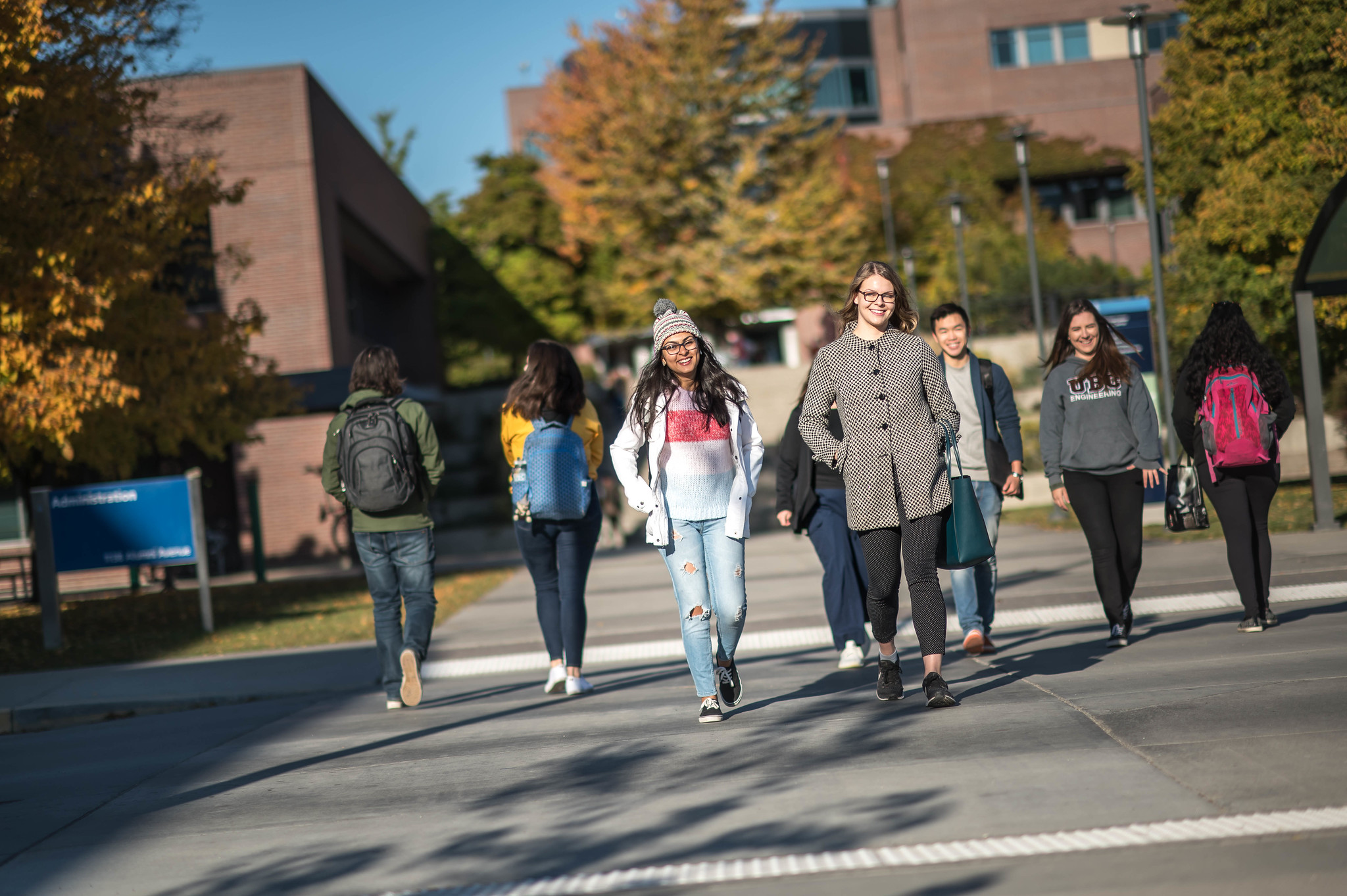
Built & Natural Environments
![]()
Active Transportation
At least 66% of all trips to and from UBC Vancouver made by walking, cycling or transit by 2040.
At least 55% of all trips to and from UBC Okanagan made by walking, cycling or transit by 2040.
Measure
% of trips made by walking, cycling or transit
| Campus | Data | Change from baseline (B) |
| Vancouver | 51% | -5% (decline) |
| Campus | Data | Change from baseline (B) |
| Okanagan | 40% | -3% |
Data:
- Baseline from 2019/20 (pre-COVID pandemic)
- Latest data: 2021/22 (during COVID pandemic)
![]()
Complete Communities
Increase opportunities for people to learn, work, play, and live on our campuses through an increase in the number of student beds to 17,300 and an increase in child care spaces to 1,200 by 2040.
Measure
# of student beds
| Campus | Data | Change from baseline (B) |
| Vancouver | 12,711 | +286 |
| Campus | Data | Change from baseline (B) |
| Okanagan | 2,120 | +440 |
Data source: Campus + Community Planning
- Baseline from 2019/20 (pre-COVID pandemic)
- Latest data: 2021/22 (during COVID pandemic)
Measure
# of child care spaces
| Campus | Data | Change from baseline (B) |
| Vancouver | 987 | +27 |
| Campus | Data | Change from baseline (B) |
| Okanagan *Childcare facilities are not run by UBC on this campus | N/A | N/A |
Data source (UBC-V only): Campus + Community Planning
- Baseline from 2019/20 (pre-COVID pandemic)
- Latest data: 2021/22 (during COVID pandemic)
Built & Natural Environment Highlights
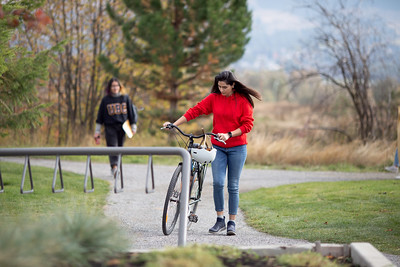
On March 29, 2022, UBC-O students, faculty, and staff gathered for their first global Climate / Justice ‘Teach-In’ event and an introduction to UBCO’s Climate Action Plan 2030. Organized by the Climate Action Plan Engagement Working Group (CAP-E) formed shortly after UBC Board endorsement of the UBC-O Climate Action Plan (CAP 2030), this event discussed interconnected climate and justice issues and explored how research in diverse disciplines is supporting solutions.
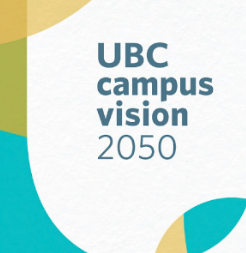
Over the past decade, UBC Vancouver’s campus has seen drastic changes. With 20% more students on campus, 25% more faculty and staff, and nearly double the number of neighbourhood residents, UBC’s daytime population has increased from 61,000 to an estimated 80,000 people. This has led to more than 4 million sq. ft. of new institutional space being added.
In response to an evolving campus the 2050 Campus Vision was developed as a long-term plan that supports the needs of the university and balances the multiple interests of xʷməθkʷəy̓əm (Musqueam) and the UBC community. The next 30-Year Vision must thoughtfully respond to major, global forces like climate change, reconciliation, and the changing nature of work and study, all while supporting UBC's pursuit of excellence in teaching, learning, research and engagement. This plan considers UBC’s unique relationship to the land, partnership with xʷməθkʷəy̓ əm (Musqueam), housing, future university needs and a SkyTrain extension to the campus.
The project was launched in mid-2021 with a Preliminary Terms of Reference, which was developed with input from the administration, discussions with xʷməθkʷəy̓ əm (Musqueam) representatives, and focus groups with the UBC community. This was further refined and enriched with broad community feedback and engagement. Currently, test options that provide a high level, long-term development vision are being developed with more public engagement.
Learn more about Campus Vision 2050
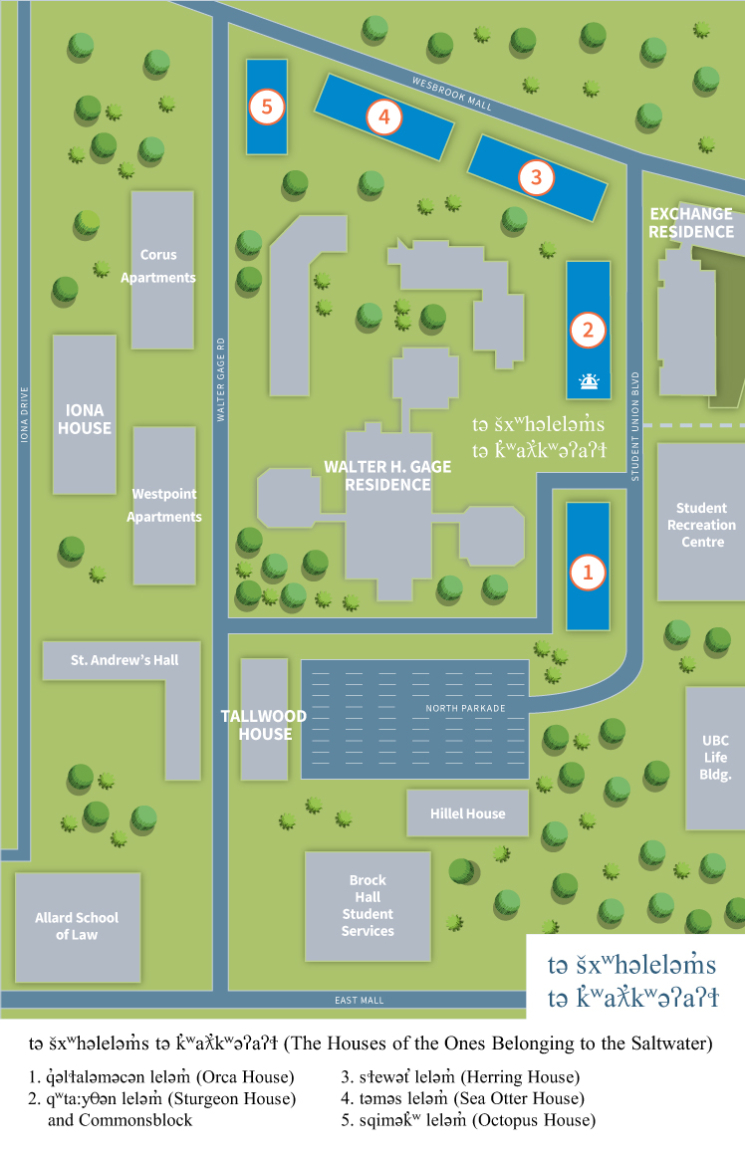
All five buildings at the newest residence community, tə šxʷhəleləm̓s tə k̓ʷaƛ̓kʷəʔaʔɬ (The Houses of the Ones Belonging to the Saltwater), are now open as of spring 2022 at UBC Vancouver. This residence community added 743 beds for students on campus, plus some additional hotel spaces for our Conferences and Accommodation department.
The residence name and each house name were gifted by Musqueam starting with, q̓əlɬaləməcən leləm̓ (Orca House) and qʷta:yθən leləm̓ (Sturgeon House) opening in September 2021, sɬewət̕ leləm̓ (Herring House) opening in January 2022 and təməs leləm̓ (Sea Otter House) and sqimək̓ʷ leləm̓ (Octopus House) opening in April 2022. There are also beautiful glass walkway canopies with artwork by Musqueam artist Kelly Cannell, connecting the houses together.
Learn more
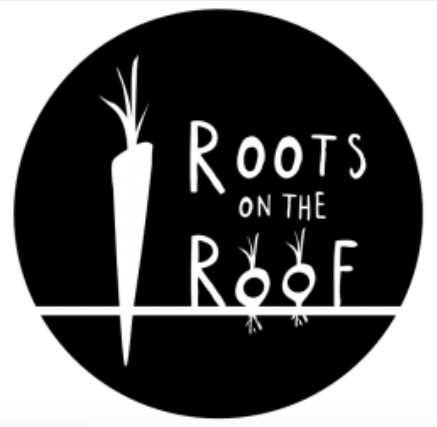
Every winter, UBC student-led Roots on the Roof celebrates a year of harvest with “Lights on the Roof”: a community lantern festival with music, warm food, games, and space for community members to come together.
Roots on the Roof is a UBC Vancouver club that manages the rooftop garden on the Nest building and aims to celebrate sustainable and just food systems through healthy relationships with food, each other and the land we live on. They offer volunteer opportunities, events and workshops to build community and create ways to connect socially around food, culture, health and sustainability.
UBC Okanagan’s new LEED Gold certified residence, Nechako Housing Commons which opened in October 2021, provided 220 new beds for students. Within this complex is the new Pritchard Dining Hall, which will keep community members energized and fueled with seating for close to 500 guests. This inclusive dining hall offers a large selection of food options that meets different tastes and dietary preferences. Additionally, the new residence has a convenience store, common area and study space, Student Housing front desk and a future Student Learning Hub to help connect students and peer mentors.
A new Residence Wellness Hub can also be found in Nechako Housing Commons which offers support for campus wellness and education, counseling and HaRT/Student Recovery Community and has a registered nurse and nurse practitioner.
UBC Okanagan celebrated its one-year anniversary for its energy-efficient, six-story student residence featuring passive-house certification, which requires little energy for heating or cooling. This is the first of its kind in Canada. It uses 90% less heat and energy than conventional buildings.
‘“The thermal stability of the building means students hardly ever need to touch the thermostat. With heat and air conditioning needed only sparingly, the power usage is kept to an absolute minimum without compromising liveability,”’ said Shannon Dunn, UBCO’s director of business operations.
Read more here
UBC Wellbeing Annual Report 2021-22 Infographic
A summary of wellbeing highlights from across UBC campuses, download the latest infographic here.
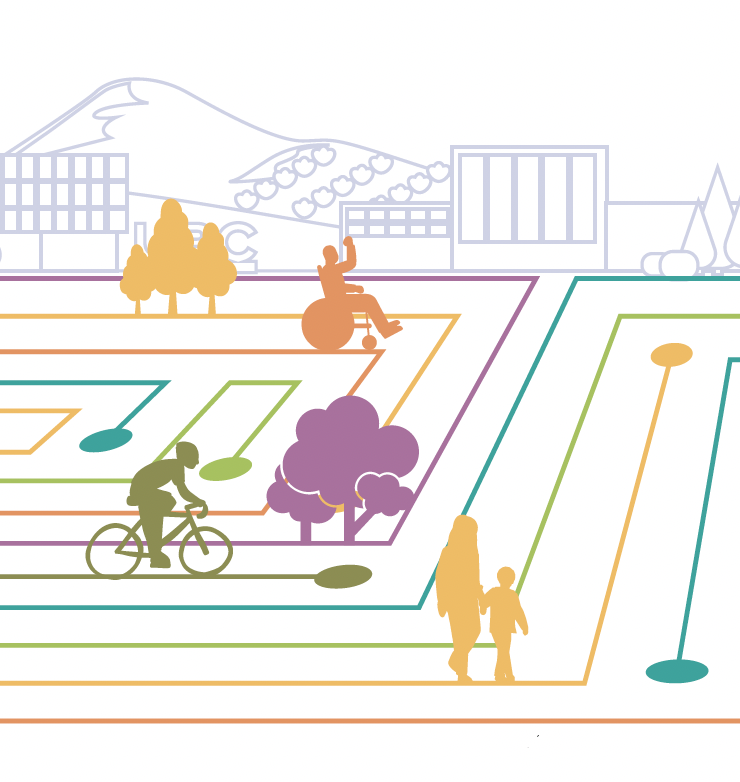
Data in this Report
UBC Wellbeing targets and metrics shared in this Annual Report aim to give a snapshot of our campuses. These indicators were selected through consultation with a number of stakeholders and we continue our collaborative work around data collection and work across units and departments to advance the targets.
Indicators shared in this report rely on data from a variety of sources, such as the Undergraduate Experience Survey, (for current undergraduate student data presented), the Workplace Experience Survey, and the Canadian Campus Wellbeing Survey (CCWS). Additionally, data is used from various partners, such as Student Housing and Community Services, Campus and Community Planning, and UBC HR.
Student and staff response rates for the CCWS 2021 were 13.6% and 12.8% respectively. Thus the findings are descriptive of the responses received, not the full population and may not reflect actual behaviours. We encourage UBC stakeholders to consider the survey responses along with other relevant data, stories, and information. The Wellbeing Strategic Framework metrics report on the Top 2 response categories, for example, the percent of respondents who ‘strongly agree’ or ‘agree’ rather than those who ‘somewhat agree’, ‘somewhat disagree’, ‘disagree’, or ‘strongly disagree’.
To focus action, the Wellbeing Strategic Framework identified targets and metrics that support our understanding of impact and change. In an institution like UBC, the complexity of population-based data cannot be underestimated. Aligning metrics across populations and coordinating survey instruments remains a challenge demonstrated by data gaps as well as the current lack of baseline data and targets for some priority areas.
UBC Wellbeing is working with partners to address these challenges and align measures.

